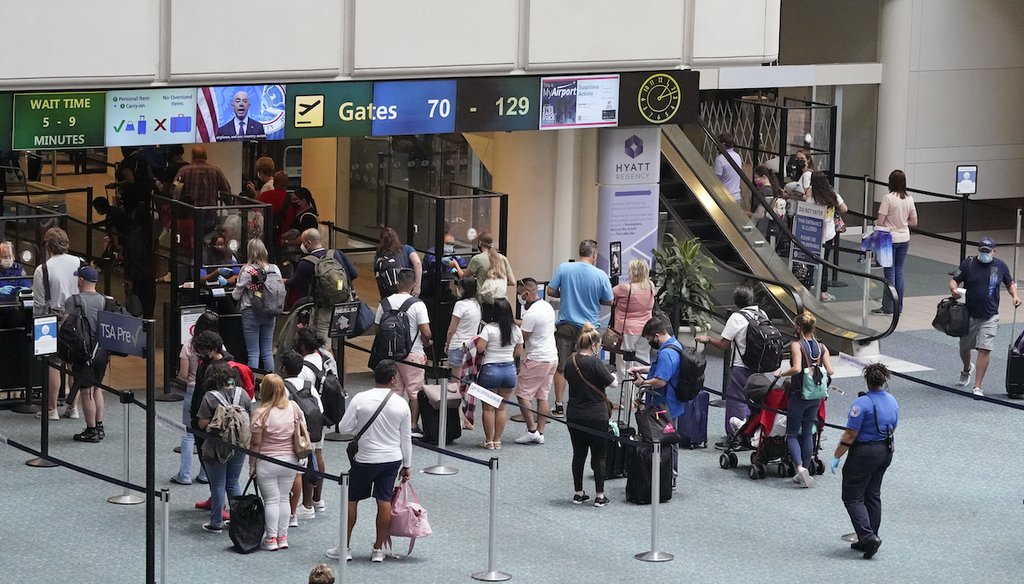Stand up for the facts!
Our only agenda is to publish the truth so you can be an informed participant in democracy.
We need your help.
I would like to contribute

Travelers line up to go through a TSA checkpoint at Orlando International Airport on May 28, 2021. (AP)
If Your Time is short
• Legal experts say the Constitution generally recognizes a right to travel between the states.
• But it’s not an absolute right. Courts have traditionally balanced this right against competing rights, including public health needs. Often, public health demands have come out on top.
With President Joe Biden moving to tighten vaccine requirements, some Republicans have pushed back, arguing that Biden’s policies unduly constrain personal liberty.
During a Sept. 16 interview on the conservative channel Newsmax, Rep. Madison Cawthorn, R-N.C., focused on the prospect that Biden could make vaccination a requirement for interstate travel, such as on a plane. (Biden has not issued such an order, though one of his first acts as president was requiring masks for interstate travel.)
"This is a medical apartheid plain and simple," Cawthorn said, adding, "They want to start shutting down air travel to these people to get around the country? I think that’s actually a constitutional violation, because you actually have a constitutionally protected right to free, unrestricted travel within the United States of America."
Legal experts say Cawthorn is right that the Constitution recognizes a general right to travel between the states. However, they added that this right is traditionally balanced against other, competing rights — including public health and safety needs — and those other rights are often granted greater deference in the courts. (Cawthorn’s office did not respond to an inquiry.)
"There is a constitutional ‘right to travel,’ but it isn’t absolute," said Wendy E. Parmet, director of the Center for Health Policy and Law and Northeastern University.
On one hand, several portions of the Constitution are generally considered to support freedom of travel between the states, said Eugene Volokh, a UCLA law professor. They include the Privileges and Immunities Clause — which says that "the citizens of each state shall be entitled to all privileges and immunities of citizens in the several states" — as well as a related provision in the 14th Amendment.
On the other hand, Volokh and every other legal analyst we contacted agreed that this right is not unlimited.
While the Supreme Court "has recognized a right to interstate travel" in such cases as Saenz v. Roe from 1999, "it's not an unfettered right," said Jonathan H. Adler, a Case Western Reserve University law professor. "The regulation of interstate travel — think Transportation Security Administration measures — don't necessarily infringe upon that right."
Indeed, the TSA, a federal agency created in the aftermath of 9/11, has myriad restrictions on what passengers can bring aboard a domestic flight, from alcoholic beverages over 140 proof to ammunition to axes. And those are just the items beginning with the letter A. (These rules even apply to flights within a state.)
The TSA also requires a valid form of identification, an X-ray scan of both checked and carry-on bags, and a scan of passengers by a metal detector, all in the name of public safety. Together, these conditions make travel anything but "free" and "unrestricted," yet they are constitutionally protected practices.
The federal regulatory role of interstate travel springs from the Constitution’s Commerce Clause, which gives Congress the power "to regulate commerce … among the several states."
"Since interstate travel is an area where states might not be able to cooperate and might discriminate against residents of other states, the power over interstate travel is in some ways given to the federal government," said Kermit Roosevelt, a University of Pennsylvania law professor.
Public health concerns have long been considered an area where the federal government can legitimately exercise its power over interstate travel, legal analysts said.
For instance, the Supreme Court decided in the 1877 case Railroad Co. v. Husen that a state "may exclude from its limits ... persons afflicted by contagious or infectious diseases."
That said, rulings in recent pandemic-related cases suggest that the courts, and especially conservative judges, are less likely than in the past to embrace a public-health justification for a new government regulation. So it’s unclear whether today’s courts would uphold a vaccine mandate as a condition for interstate travel.
Such a policy "is untested," Parmet said. "The Centers for Disease Control and Prevention arguably has such authority, but neither the Public Health Services Act nor CDC regulations are spot on, and courts might well say it doesn’t."
At the very least, a vaccine requirement for interstate travel might need to have certain exceptions, such as religious and medical exemptions, Adler said. "It's hard to know whether a specific measure would likely be upheld without seeing the particulars," he said.
Still, Ilya Somin, a George Mason University law professor who supports limits on federal power, acknowledged that there’s a strong legal case for requiring COVID-19 vaccines for travel on public-health grounds. Striking down such a mandate for plane travel would require a major reversal of longstanding interpretations by the courts, he said.
CORRECTION, Sept. 22, 2021: This version of the article has been updated to add an ellipsis in the quotation from the Supreme Court case Railroad Co. v. Husen.
Our Sources
Madison Cawthorn, remarks on Newsmax, Sept. 16, 2021
Privileges and Immunities Clause
Supreme Court, Saenz v. Roe, 1999
Supreme Court, Railroad Co. v. Husen, 1877
Eugene Volokh, "Restrictions on Interstate (and Intrastate) Travel in an Epidemic," April 4, 2020
PolitiFact, "Will Joe Biden’s vaccination requirements hold up in court?" Sept. 15, 2021
Email interview with Eugene Volokh, UCLA law professor, Sept. 17, 2021
Email interview with Kermit Roosevelt, University of Pennsylvania law professor, Sept. 17, 2021
Email interview with Jonathan H. Adler, Case Western Reserve University law professor, Sept. 17, 2021
Email interview with Wendy E. Parmet, director of the Center for Health Policy and Law and Northeastern University, Sept. 17, 2021












































